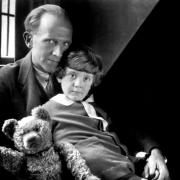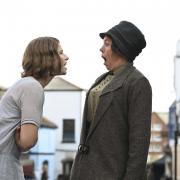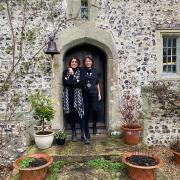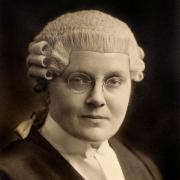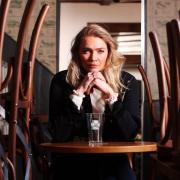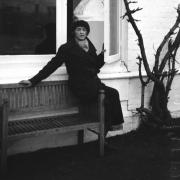Brighton-born actor Ray Brooks is a man of many parts. He was a symbol for the homeless in the gritty TV film Cathy Come Home, played a chancer in the Eighties comedy drama Big Deal and even gave voice to that iconic children's TV character Mr Benn
Do you think you'll recognise me?" asks Ray Brooks, when we fix a meeting over the telephone. Ray, it seems, has never been blessed with self confidence - a feeling that's underlined when I read his newly published autobiography. In the first few pages he reveals that the actress Miriam Margolyes once told him: 'The trouble with you, Ray, is that you don't like yourself and you're ill educated.' He assures me that the words didn't sting, but he's never forgotten them. Well, you wouldn't, would you?
The irony is that in the sixties Ray was one of the 'beautiful people' when, as he puts it, everyone was "tight trousered and alluring". He made his name in the 1965 film The Knack... and How to Get It, which was directed by Dick Lester and starred Michael Crawford and Rita Tushingham. Ray played a serial womaniser with a taste for sharp suits, 'fast birds' and Harley-Davidsons.
Life was sweet. The film studio sent a Rolls Royce to whisk him from his rented flat in Kilburn to the Cannes Film Festival, where the movie won the Palme d'Or. He remembers a blur of luxurious hotels and private beaches. Princess Margaret and The Beatles even attended the film premiere.
But life grew sweeter still. In 1966, Ken Loach asked him to play opposite Carol White in Cathy Come Home, a gritty BBC docu-drama about an unmarried mother, which highlighted the problem of homelessness. Filmed entirely on location and featuring long sections of improvisation, the seminal film was watched by 12 million people - then a quarter of the British population - and irrevocably changed public opinion.
Ray was poised for big things - or should have been. But although, years later, he made a comeback in the Eighties primetime drama, Big Deal, in which he played the loveable, small-time London gambler, Robbie Box, and returned again to our screens two years ago as Pauline Fowler's love interest in EastEnders, he never really capitalised on his early success.
"I was naive," he says. "I thought casting directors would come to me. But although people did offer me work, very often the films didn't materialise because they couldn't get the money together. And, actually, I don't think I was ever that good an actor. I was more an image of a young man. I was never as good looking as, say, my contemporary, David Hemmings. And don't forget this was the period of Terence Stamp. So there was a lot of competition."
Voice of Mr Benn
We are chatting in the Victoria Lounge at the Grand Hotel in Brighton where Ray is staring into a cup of strong coffee. He is 70 now, with white, tufty hair. But as soon as he opens his mouth, the memories come flooding back.
Ray, you see, has one other claim to fame. He's the voice of that iconic children's TV character, Mr Benn. Only 13 episodes were ever made back in the late Sixties, but they have been endlessly repeated. Ray believes the appeal of the programmes lies in their naivety. David McKee, the creator, had never drawn a cartoon, so he kept things simple. And in this fast-moving digital age, the series has a beguiling innocence and charm.
Now Ray is poised to breathe new life into the little chap by rerecording the series for the digital age. "The episodes were originally made in a four-track studio with very little sophistication, so the sound quality is a bit iffy," he says. He hasn't earned a penny from all those repeats (the programmes were made in the days before repeat fees), but this time round he will earn 10 per cent of the net profit.
His voice, as he puts it, may have dropped into his boots since his Mr Benn days, but it doesn't go unrecognised. That's scarcely surprising because in the Seventies he was the king of the voiceover - the voice of Flora and Currie Motors. "Nice people to do with business with..." he says, repeating the London-based car dealer's famous tag line. "That ran for five years. The only thing I didn't do was dog food." He says his voice resonates with the public because it sounds comforting and sincere. His secret? "I smoke Old Holborn tobacco and drink lots of beer," he laughs earthily.
He has his mother to thank for his vocal technique. He was a working class lad growing up in Whitehawk in Brighton, but she sent him for elocution lessons. "She wanted better for me. The idea was that I could go and work in a Barclays Bank if I wanted to. People who spoke well were considered trustworthy."
He paints a fond portrait of his mother in his autobiography, in which he evocatively describes his boyhood memories of Brighton. "All the streets seem to hold memories," he writes. "I glimpse ghosts around almost every corner."
He vividly remembers Divall's, the renowned Brighton cafe where his mum, a bus conductress, enjoyed a cup of tea. He remembers Rock's, an Aladdin's Cave for young boys, stuffed with pea shooters, catapults, potato guns, bouncing balls and stink bombs dubbed "the biggest stink since Hitler". Best of all, he remembers the Regency Cinema and Ballroom on Queen's Road, where he and his mum watched A Song to Remember no fewer than 37 times, huddled in the back row under a blanket.
"I was born in 1939, just before the war, and I recall barbed wire along the beach and barrage balloons," he says. "In those days, Brighton was full of cinemas, theatres and concerts halls. My mum used to take me to concerts at the Brighton Dome. We saw the Italian tenor Tito Gobbi and the Australian pianist Eileen Joyce. I even saw Joan Collins when she was 19 and a Rank starlet. A stunning-looking woman."
His mother had fallen pregnant with Ray after a fling with a young soldier called John Brooks, who lived round the corner in Montpelier Crescent. At least, Ray thinks that's the story. He can't be certain. A paternity test proved inconclusive.
His mother, a Catholic, never overcame the guilt and only admitted to him that he was illegitimate when he was 20. But it didn't hold him back. Those elocution lessons paid off and he won first prize in a poetry recital competition at Brighton's Royal Pavilion. Afterwards, his teacher suggested that his mother might like to consider enrolling him for acting classes to boost his self confidence. The limelight was beckoning.
Exhausted in EastEnders
Fast forward 50 years or so and Ray is sitting in a drab dressing room on the set of EastEnders, wondering where it all went wrong. Ironically, he'd hankered to be on the soap for years, viewing it as a dependable retirement home. He'd also wanted to do it as a tribute to his late daughter Emma, who had been a big fan of the show until her death from cancer in 2003.
But within weeks of landing the role of Joe Macer, who was to be Pauline Fowler's new love interest, disillusionment sank in. "The cast greeted me with tremendous enthusiasm and I thought it was going to be glorious," he says. "But gradually all that subsided as they got back into the old routine and I quickly noticed how tired everyone looked."
Days on set were long, with few laughs, he says. And although he admired the stamina and discipline of his fellow actors, he learned you had to watch your back against petty rivalries. He says that the "shabby sets and poor scripts", not to mention "the lack of rehearsal time", did nothing to alleviate his gloom. And he sank into a quiet despair, longing for the praise that never came.
Ray took refuge in the smoking room, where, among others, he fell in with June Brown, "a real joy in the doom and gloom", and Barbara Windsor, "bubbly, flirtatious and showbiz to her fingertips". And then there was his screen wife, the late Wendy Richard (she died of breast cancer in January last year), with whom he was to share most of his scenes. All started well. She took him under her wing and introduced him to cast and crew. She even forcibly advised one director not to edit his scenes because Ray had been in the business even longer than she had. He affectionately christened her 'Brown Owl', but things got worse when Wendy discovered that the scriptwriters were planning to take them up the aisle.
"From then on, it all went wrong," he says. "She demanded to know why we couldn't just live together - like she had with Ian Lavender. But I explained that Ian's character had been gay and I was heterosexual - and it just wouldn't work."
Eventually, Wendy tried to stare the producers down - threatening that she'd quit if they didn't cut the marriage scene. But they refused and she resigned, informing one tabloid newspaper that she'd never enjoyed the chemistry with Ray that she'd had with her first screen husband, Bill Treacher. But Ray adds: "Of course, we had no idea how unwell she was."
He was axed from the soap in January 2007, but doesn't regret his time on EastEnders. "It was a good lesson, though admittedly one I didn't need at my time of life," he says. "If I'd done it a little earlier, I would have probably been more confident and been given better stuff. But I went in timidly, and timidity is not appreciated in the big bad world."
Little work came his way after he left the soap. "Coronation Street talked about a two-year contract, but the money was even worse than EastEnders, so I turned it down. And Doctor Who asked me to audition for an episode, but the part was dreadful and they didn't even know who I was. I recited a truncated version of my CV as I walked out because I felt so pathetic."
Through thick and thin, however, he has always had one thing to fall back on - his wife of 50 years, Sadie. They met in a coffee bar in North Street, Brighton, just days before her first marriage and she never forgot the cheeky young man on the pin ball machine who had asked for a kiss. They live in London, but have owned a flat in Brighton, where they regularly spend weekends, since the height of Ray's voiceover days.
I ask what has sustained their marriage, and he says: "Memories that no one else has; shared times of the children when they were very young. We are archivists of our history."
They had three children, although the death of their beloved daughter Emma, a social worker, has left a massive hole. "Sadie often asks why we don't talk about it, but it's almost too big - too painful."
Looking back over his career, I ask whether he has any regrets. "There are one or two things where I didn't quite step up to the plate, but I have some wonderful memories," he smiles. But life, he intimates, is far from over. "I've got two more grandchildren arriving this year and I'd like to see them grow into teenagers. I feel a big responsibility towards them." He grins: "I'd better write some more books!"
Learning My Lines by Ray Brooks is published by The Book Guild at �14.99.



